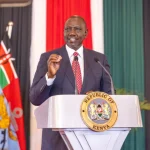Tensions are once again rising between Venezuela and the United States after President Nicolás Maduro accused Washington of “fabricating and provoking war” in Latin America following the deployment of the world’s largest warship near Venezuelan waters.
Maduro, speaking during a live national broadcast on Thursday night, accused the U.S. of deliberately attempting to create instability in the region through military intimidation and political interference.
“The United States is fabricating war in our region,” Maduro declared. “They are not interested in peace or stability; they want control, chaos, and conflict.”
His comments came shortly after the USS Gerald R. Ford, the most advanced aircraft carrier in the world, was deployed to the Caribbean as part of what U.S. officials described as a routine maritime mission.
However, Caracas has strongly condemned the move, calling it an “imperialist provocation” designed to threaten Venezuela and its allies.
Washington Denies Aggression
The Pentagon has dismissed Maduro’s claims, insisting that the warship’s deployment has “no connection” to Venezuela and is part of broader efforts to combat drug trafficking and ensure maritime security across the region.
“This is not directed at any particular nation,” said Pentagon spokesperson Laura Smith. “The United States remains committed to ensuring peace, stability, and freedom of navigation across international waters.”
Despite the reassurance, analysts believe the move could further fuel tensions in an already fragile geopolitical climate.
Maduro Calls for Regional Unity
Maduro urged neighboring Latin American nations to unite against what he described as a “foreign military buildup” aimed at intimidating sovereign states.
“They come with warships, but we will respond with unity,” he said. “Venezuela, together with our allies, will not bow to imperial threats.”
He accused Washington of using its military and economic power to manipulate governments and destabilize nations that refuse to align with its policies.
Maduro also hinted at strengthening military cooperation with Russia, China, and Iran, nations that have consistently opposed U.S. sanctions against Venezuela.
Russia and China React
Following Maduro’s statement, both Russia and China voiced concern over the U.S. deployment. The Russian foreign ministry described the move as a “reckless act of intimidation,” while Beijing urged Washington to pursue “peaceful diplomatic solutions” instead of escalating tensions.
“The deployment of such a massive warship near Latin America serves no purpose other than to increase confrontation,” said Russian spokesperson Maria Zakharova.
These responses underscore the growing global polarization as major powers continue to take sides in regional disputes, reflecting a shifting balance in international politics.
Background: Long-Standing Tensions
Relations between the U.S. and Venezuela have remained strained for over two decades. The United States has imposed numerous sanctions on Caracas over alleged human rights abuses, corruption, and suppression of political opposition.
Maduro’s government, on the other hand, accuses Washington of supporting attempts to overthrow his regime and seize control of Venezuela’s vast oil resources.
The latest development — involving the world’s largest and most powerful warship — marks a new chapter in a conflict that has long extended beyond economic and political spheres into military posturing.
Analysts Warn of Escalation
Global security analysts warn that the deployment could increase the risk of military confrontation if diplomatic channels break down.
“While the U.S. claims this is a routine operation, the timing and location make it politically significant,” said geopolitical analyst Dr. Carlos Mendoza. “It sends a powerful signal to both Venezuela and its allies that the U.S. intends to maintain dominance in the Western Hemisphere.”
He added that the move might also be a show of strength aimed at deterring Russian and Chinese influence in Latin America.
Maduro’s Defiant Message
In his closing remarks, President Maduro emphasized that Venezuela remains committed to peace but will not tolerate foreign intimidation.
“We are a peaceful people,” he said. “But we are not afraid. Our nation’s sovereignty is not up for negotiation.”
He urged Venezuelans to stay united and vigilant, while government forces increased patrols along the country’s northern coast in what officials described as a “defensive precaution.”
A Region on Edge
The deployment of the USS Gerald R. Ford — capable of carrying over 75 aircraft and more than 4,500 personnel — is the latest sign of intensifying global tensions.
While Washington maintains it’s a strategic security operation, critics view it as a symbol of U.S. military dominance at a time when global powers are competing for influence across multiple continents.
For now, both Caracas and Washington appear to be standing firm — setting the stage for a possible diplomatic showdown that could reshape the geopolitical balance of the Western Hemisphere.










